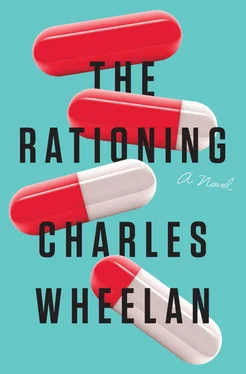Shortly after the President arrived back from Australia, one of the interns in the mailroom phoned the Chief of Staff. “I think you should see this,” she said.
“Have you alerted security?” the Chief of Staff asked distractedly.
“It’s not that. I just think you should see this, maybe the President, too.”
“Can you just bring it up?”
“It’s pretty heavy.”
“What do you mean?”
“I mean it’s too heavy for me to carry.”
“Okay,” the Chief of Staff agreed. In the midst of everything else that was going on, she could not have been happy to trudge down to the basement office where the screened mail was sorted, but that is what she did.
When the Chief of Staff arrived in the cramped office, a glorified closet with exposed pipes running across the ceiling, the intern pointed at a brown box about the size of a laser printer. It appeared to be full of paper clips of all colors and sizes. “Paper clips?” the Chief of Staff asked.
“Uh-huh.”
The Chief of Staff ran her hand through the paper clips, letting them slip through her fingers. “Are you sure security cleared this?”
“It’s from an elementary school outside of Chicago.”
“I think we’re fine on office supplies.”
“It’s based on a documentary,” the intern explained. “I looked it up online. There’s this film about a group of elementary school kids who collected six million paper clips, one for each Jew killed in the Holocaust.”
“And this?” the Chief of Staff said, pointing at the box.
“I’d bet it’s about forty thousand, one for each person who will not get Dormigen—”
“Of course.” They both stared at the box for a while. “That’s a lot of paper clips,” the Chief of Staff said softly.
“Do you think the President will want to see it?” the intern asked.
“I do,” she said. And then, “He should, in any event.”
Later, when the President returned to the Oval Office from a meeting in the situation room, the Chief of Staff was waiting for him, along with the open box of paper clips that had been wheeled on a cart up from the basement. The President noticed the box immediately. “What’s that?” he asked.
“It came from an elementary school near Chicago,” the Chief of Staff answered. There was a brief silence as the President waited for the balance of the explanation and the Chief of Staff decided how to couch it. “There’s one paper clip in the box for each person who would be denied Dormigen—”
“Like the documentary,” the President said.
“Yes, exactly,” the Chief of Staff replied. He still surprised her on occasion, despite their many years working together. The typical day in the White House was a blur of fifteen-minute meetings; the President survived by exercising good judgment and knowing just enough about a lot of things. It was the opposite of her experience in academe, where her colleagues could spend hours drilling down on the most obscure of topics. She would sometimes forget that the President was a reader and a film enthusiast; it was his escape. After his divorce, he spent a long stretch alone in Washington. There had been a lot of media buzz in those years about his antics as one of the nation’s most attractive bachelors, but the reality was that he retired most nights to his tiny apartment with a book or a film. Even in the White House, with the First Lady traveling frequently, he would do the same, after the Chief of Staff had gone home to her husband and teenagers. On occasion, the President would invite authors or directors to dinner—not the famous ones, as he had no particular affinity for celebrities, but a historian or an accomplished filmmaker. The Chief of Staff should not have been surprised that he had seen an obscure documentary about schoolchildren who collected six million paper clips, even though she was.
“Leave them here,” the President instructed.
“In the middle of the office?” she asked.
“Somewhere everyone can see them,” he said. The paper clips were different sizes and colors: big, little, metallic, green, blue, bright pink. There was one paper clip resting on top with a sticky note attached to it. The President was not wearing his glasses when he picked it up, so he could not read the tiny elementary-school handwriting. But he knew what it said: Cecelia Dodds. In subsequent days, when staff members would ask about the box, or make jokes about buying paper clips in bulk, he would explain their significance.
Not long ago, when the President was in the final months of his term, he visited the students who had done the Dormigen paper-clip project at their elementary school in a Chicago suburb. The President spent nearly an hour and a half talking to the student body and answering questions, an unheard-of amount of time for a presidential visit. “Your project was a crucial reminder for me during the Outbreak of how our decisions would affect real people,” the President told the assembled students, most of whom were too young to appreciate the significance of what they were hearing. “That didn’t make it easier—harder, probably. But we needed that. We needed a constant reminder that the decisions we were making would affect real people and families—thousands and thousands of them,” the President explained.
The event garnered a great deal of national and international attention. To that point, the President had said relatively little about his decisions during the Outbreak. There was speculation that his elementary school visit would prompt some newsworthy reflection. By then, however, the President was thoroughly fed up with the media. He ordered the student assembly closed to the press, except for two reporters from the school newspaper, the Springhill Chronicle . [31] Some of the questions for the President, as reported by the Springhill Chronicle , included: “Why don’t you have a cat?” and “What do you normally eat for breakfast?”
The balance of the media—over a hundred photographers, videographers, pundits, writers, and bloggers—were relegated to the school parking lot while the President spoke inside. Then, in a moment of delicious irony orchestrated by the President, one of the student writers for the Springhill Chronicle was deputized to give a pool report for the global media assembled outside.
“It’s going to be a pool event,” the Communications Director told the traveling White House press corps, smirking visibly. (When events were space-constrained, or when a large group of reporters might disturb an event, such as a visit to the bedside of a wounded soldier, the Communications Office would choose a single reporter and cameraperson to cover the event and share information and photos with the rest of the “press pool.” However, the reporter designated for such responsibility was not usually an eleven-year-old writer for the Springhill Chronicle. ) After the event, the President stood on a patch of grass outside the school, smiling and silent, as eleven-year-old Dan “Bucky” Riegsecker reported dutifully on what had been said inside. Correspondents from the New York Times , the Washington Post–USA Today , Home Depot Media, and all the major cable news stations—notebooks out, cameras rolling—lapped up the tidbits Bucky tossed their way.
THE PHONE RANG AT THE U.S. AMBASSADOR’S RESIDENCE IN New Delhi around midnight. It was Sumer Patel requesting a meeting as soon as possible between the Indian Prime Minister and the U.S. Secretary of State. “The Secretary of State is in Bahrain,” the Ambassador told Patel.
“It’s just three hours away,” Patel pointed out.
“Yes, that is fortunate,” the Ambassador agreed. “I can’t say for certain, but given the urgency of the situation, the Secretary of State might be able to get here in the morning.”
Читать дальше












